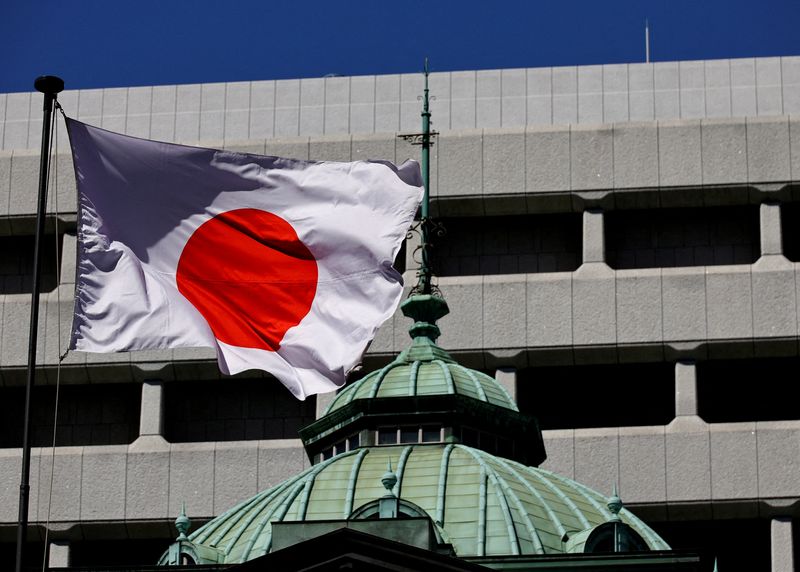By Leika Kihara
TOKYO (Reuters) -Bank of Japan board members turned overwhelmingly hawkish at their April policy meeting with some seeing the chance of interest rates rising faster than anticipated, a summary of opinions at the meeting showed on Thursday.
Many in the nine-member board called for steady rate hikes on prospects that inflation could durably stay, or even exceed, the central bank's 2% target, the summary showed.
"If underlying inflation continues to deviate upward from the baseline scenario against the backdrop of a weaker yen, it is quite possible that the pace of monetary policy normalisation will accelerate," one member was quoted as saying.
The hawkish debate comes as BOJ Governor Kazuo Ueda signals the chance of multiple rate hikes ahead, heightening the possibility of an increase in short-term borrowing costs in coming months.
Ueda told parliament on Thursday the central bank will scrutinise how the yen's recent declines affect the economy and inflation, in setting monetary policy.
"If currency volatility affects, or risks affecting, trend inflation, the BOJ must respond with monetary policy," he said.
The BOJ's hawkish signals helped slow declines in the yen, which has been grinding lower after a spike last week triggered by Tokyo's suspected currency intervention.
But the yen's rebound was brief with markets still decidedly bearish on the currency, and many traders sidelined ahead of next week's release of U.S. inflation data that could affect the timing of the Federal Reserve's future interest rate cut.
The dollar stood at 155.59 yen on Thursday, up from last week's low of 151.86.
Finance minister Shunichi Suzuki repeated his warning against excessive yen falls, telling parliament on Thursday that he was worried about the damage the currency's weakness could inflict on the economy such as through higher import costs.
NO LIMITS
At the April meeting, the BOJ kept interest rates near zero and produced fresh quarterly estimates that projected inflation to stay near 2% through early 2027, signalling its readiness to hike borrowing costs later this year.
Many of the opinions shown in the summary called for the need to raise interest rates steadily and consider reducing the size of the BOJ's bond purchases in the future.
One member said the BOJ must raise interest rates in a "timely and appropriate manner," as the likelihood of achieving its growth and price projections heightens, the summary showed.
"If the outlook shown in our April quarterly report is realized, our 2% inflation target will be sustainably and stably achieved in about two years and the output gap will be positive," another opinion showed. "Therefore, there's a chance our policy interest rate will be higher than the path currently priced in by the market."
Many market players expect the BOJ to hike interest rates later this year, though they are divided on how quickly borrowing costs might rise thereafter.
Other opinions also called for the BOJ to indicate, at some point, its intention of reducing its huge bond buying and start shrinking its balance sheet, the summary showed.
Faster-than-expected rate hikes, or any reduction in the BOJ's bond buying, could help slow the yen's declines, which have become a headache for policymakers as they inflate raw material import costs and hurt consumption.
"The BOJ still buys huge amounts of government bonds, so the scope to turn hawkish on this front is big," said Toru Suehiro, chief economist at Daiwa Securities.
"Reducing bond buying might be easier for the BOJ than raising rates, which requires more careful scrutiny over the impact on the economy," he said.
After the yen hit a 34-year low of 160.245 per dollar on April 29, Japanese authorities are suspected to have spent more than 9 trillion yen ($58 billion) intervening in the market to prop up the currency.
Top currency diplomat Masato Kanda on Thursday brushed aside the view that there were limits to how much Tokyo can spend to prop up the yen.
When Tokyo intervenes to support the currency, authorities tap Japan's foreign reserves for dollars to sell for yen.
Japan held $1.28 trillion in foreign reserves as of the end of April, down $11.6 billion from a month ago, Ministry of Finance data showed on Thursday.

Of the total, foreign securities - most of which are believed to be U.S. Treasury securities - fell by $16.8 billion, the data showed. A ministry official briefing reporters on the data declined to comment on whether the drop was due to last week's suspected yen-buying intervention.
($1 = 155.5500 yen)